Social Media Seen as Mostly Good for Democracy Across Many Nations, But U.S. is a Major Outlier
Most think social media has made it easier to manipulate and divide people, but also say it informs and raises awareness
BY RICHARD WIKE, LAURA SILVER, JANELL FETTEROLF, CHRISTINE HUANG, SARAH AUSTIN, LAURA CLANCY AND SNEHA GUBBALA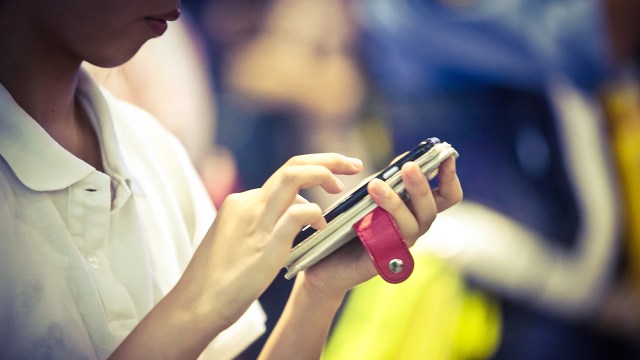 (Getty Images)
(Getty Images)How we did this
As people across the globe have increasingly turned to Facebook, Twitter, WhatsApp and other platforms to get their news and express their opinions, the sphere of social media has become a new public space for discussing – and often arguing bitterly – about political and social issues. And in the mind of many analysts, social media is one of the major reasons for the declining health of democracy in nations around the world.
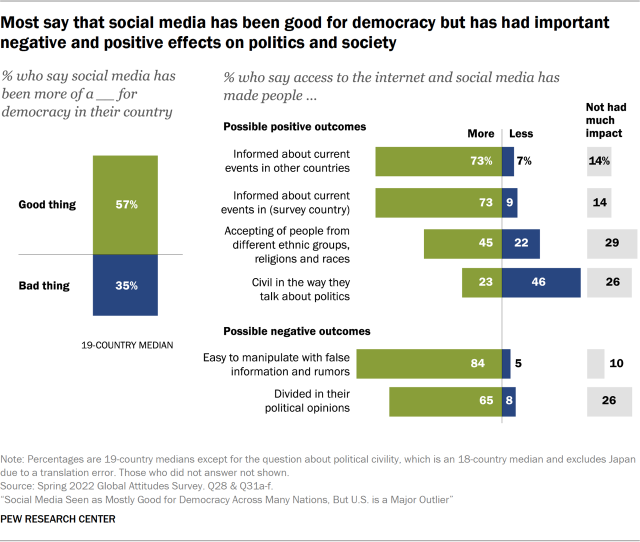
However, as a new Pew Research Center survey of 19 advanced economies shows, ordinary citizens see social media as both a constructive and destructive component of political life, and overall most believe it has actually had a positive impact on democracy. Across the countries polled, a median of 57% say social media has been more of a good thing for their democracy, with 35% saying it has been a bad thing.
There are substantial cross-national differences on this question, however, and the United States is a clear outlier: Just 34% of U.S. adults think social media has been good for democracy, while 64% say it has had a bad impact. In fact, the U.S. is an outlier on a number of measures, with larger shares of Americans seeing social media as divisive.
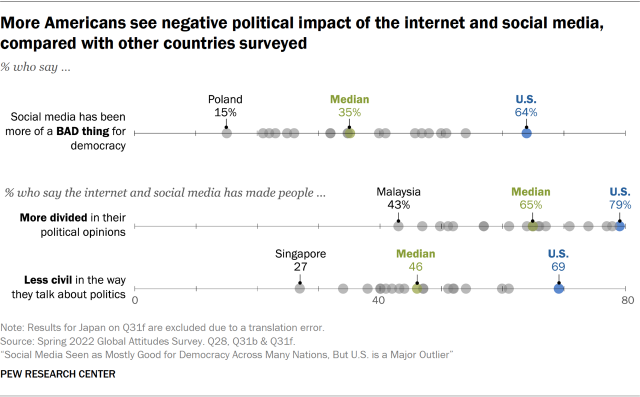
Even in countries where assessments of social media’s impact are largely positive, most believe it has had some pernicious effects – in particular, it has led to manipulation and division within societies. A median of 84% across the 19 countries surveyed believe access to the internet and social media have made people easier to manipulate with false information and rumors. A recent analysis of the same survey shows that a median of 70% across the 19 nations consider the spread of false information online to be a major threat, second only to climate change on a list of global threats.
Additionally, a median of 65% think it has made people more divided in their political opinions. More than four-in-ten say it has made people less civil in how they talk about politics (only about a quarter say it has made people more civil).
So given the online world’s manipulation, divisiveness and lack of civility, what’s to like? How can this acrimonious sea of false information be good for democracy? Part of the answer may be that it gives people a sense of empowerment at a time when few feel empowered. Majorities in nearly every country surveyed say their political system does not allow people like them to have an influence in politics. In nine nations, including the U.S., seven-in-ten or more express that view.
Online platforms may help people feel less powerless in a few ways. First, social media informs them. As a recent Pew Research Center report highlighted, majorities in these countries believe that staying informed about domestic and international events is part of being a good citizen, and it is clear that people believe the internet and social media make it easier to stay informed. Nearly three-quarters say the internet and social media have made people more informed about current events in their own country as well as in other countries. Young adults are especially likely to hold these views.
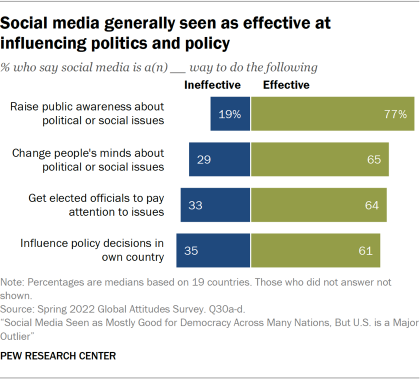
Also, most of those surveyed see social media as an effective tool for accomplishing political goals. Majorities in most countries say it is at least somewhat effective at raising public awareness, changing people’s minds about issues, getting elected officials to pay attention to issues and influencing policy decisions.
For some, social media is also an outlet for expression. In South Korea, for example, roughly half of social media users say they sometimes or often post or share things online about political or social issues. However, in the other countries polled, posting about these issues is less common, and in 12 nations four-in-ten or more say they never post about political or social topics. These are among the major findings of a Pew Research Center survey, conducted from Feb. 14 to June 3, 2022, among 24,525 adults in 19 nations.
Americans most likely to say social media has been bad for democracy
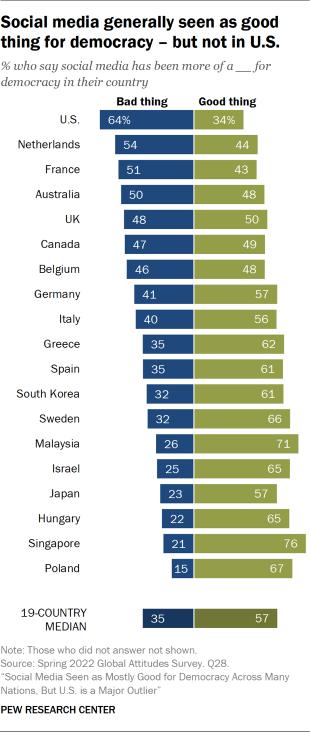
Majorities in most of the nations surveyed believe social media has been a good thing for democracy in their country. Assessments are especially positive in Singapore, Malaysia, Poland, Sweden, Hungary and Israel, where 65% or more hold this view (for data on how international research organizations assess the quality of democracy in the countries surveyed, see Appendix A).
In contrast, Americans are the most negative about the impact of social media on democracy: 64% say it has been bad. Republicans and independents who lean toward the Republican Party (74%) are much more likely than Democrats and Democratic leaners (57%) to see the ill effects of social media on the political system.
Half or more also say social media has been bad for democracy in the Netherlands, France and Australia.
In addition to being the most negative about social media’s influence on democracy, Americans are consistently among the most negative in their assessments of specific ways social media has affected politics and society. For example, 79% in the U.S. believe access to the internet and social media has made people more divided in their political opinions, the highest percentage among the 19 countries polled.
Similarly, 69% of Americans say the internet and social media have made people less civil in how they talk about politics – again the highest share among the nations in the study.
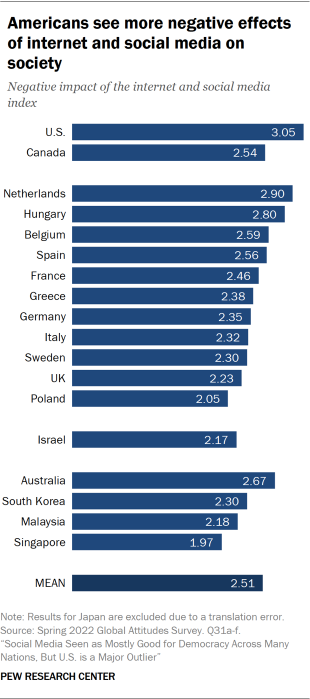
To compare how publics evaluate the impact of the internet and social media on society, we created an index that combines responses to six questions regarding whether the internet makes people: 1) less informed about current events in their country, 2) more divided in their political opinions, 3) less accepting of people from different backgrounds, 4) easier to manipulate with false information and rumors, 5) less informed about current events in other countries, and 6) less civil in the way they talk about politics.
The negative positions on all of these questions were coded as 1 while positive or “no impact” responses were coded as 0. For each respondent, scores on the overall index can range from 0, indicating they see no negative effects of the internet and social media across these questions, to 6, meaning a negative answer to all six questions. See Appendix B for more information about how the index was created.
Looking at the data this way illustrates the degree to which Americans stand out for their negative take on social media’s impact. The average score among U.S. respondents is 3.05, the highest – and therefore the most negative – in the survey. Dutch, Hungarian and Australian respondents are also more negative than others. In contrast, Malaysians, Israelis, Poles and Singaporeans offer less negative assessments.
1st Edition of International Conference on Social Media and Digital Marketing
Website Link: https://socialmedia-conferences.researchw.com/
Conference Nomination: https://x-i.me/medcon
Conference Registration: https://x-i.me/medreg1
Award Nomination: https://x-i.me/mednom
Award Registration: https://x-i.me/medreg2
Pinterest: https://in.pinterest.com/digitalmarketingconference13/



Comments
Post a Comment